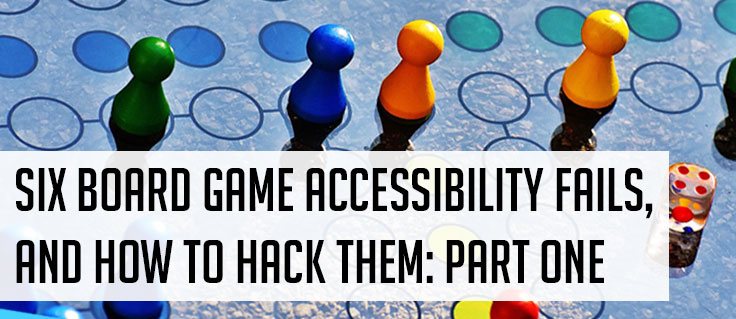I’ve always needed help playing board games, as I don’t have the range-of-motion, strength, or dexterity to do it on my own. There are actions I can do, like roll dice or pick up a card, and others I can’t, like shuffling or reaching to move pieces across the board. Gaming has always been an act of interdependence, much like all my activities of daily living, and something I’ve adapted to over the years with personal hacks.
House rules and small-scale solutions can work, but what if these adjustments were baked into the game? Thoughtful and inclusive design doesn’t just mean more disabled people can play, but it can improve the quality of the game for everyone.
In this two-part series, I point out six access barriers I’ve encountered in tabletop gaming and offer potential solutions that can work right out of the box. These access issues are from my perspective as a physically disabled individual, and the hacks below may not apply or work for everyone, but I hope my words can be a resource and starting point for designers and players alike.
 Hidden Information
Hidden Information
The Problem: Imagine this – I’m playing a deck-builder and have five cards in front of me, each with unique abilities and paragraphs of text, that I can’t physically hold up to read in private. I must put the cards face-up on the table and ask my opponent to look away. Secrecy becomes even more difficult when I shuffle through an entire deck to find a specific card. Hidden info, especially coupled with lots of text on each card, negatively affects my experience – even if the game is otherwise stunning.
The Hack: Hidden information can be fun when it’s done with accessibility in mind. For example, in 7 Wonders, each card’s purpose is in the upper left corner in vibrant, big icons. Since there’s no text involved, I can glance at my hand in under a minute. The pertinent info is in the top half of the card, making them perfect for card holders. Cooperative board games, like Harry Potter: Hogwarts Battle and Arkham Horror: The Card Game, eliminate the need to hide your info; so, I display the cards in a way that’s accessible to me. If a game isn’t cooperative, designers can include a single-sheet player aid that describes the abilities of each card. If the above options don’t work, consider adding a small player screen so folks can look at their components freely. Roll For the Galaxy and Keyflower use player screens effectively; Roll’s screen doubles as a player aid (bonus accessibility!), while Keyflower’s is designed to look like a cute house for your meeples.
 Dexterity Mechanics
Dexterity Mechanics
The Problem: This may seem impossible to solve, as dexterity is never going to work for me. Games like Flick ‘Em Up and Captain Sonar are appealing – the former for its theme and design, and the latter for its tense atmosphere culminating in high-fives and an exhilarating accomplishment. While Captain Sonar is engaging to watch, I still want to join in. It’s the equivalent of sitting on the sidelines in school, watching your friends have fun but not being able to play alongside them.
The Hack: Fortunately, I grew up with friends who understood my limitations. While I couldn’t play kickball in the traditional way, my pals included me in the sport, either throwing the ball toward my wheelchair tires so I could “kick” it, or having me carry the ball on my lap as I drove around the field. Thinking this way can apply to gaming; while I can’t do the flicking in Flick ‘Em Up, or draw quickly within the lines in Sonar, there are opportunities to create modified roles for those with physical disabilities. For example, instead of tracing lines or using a pen at all, give alternate rules that work around this – like having folks communicate through blinking, tapping, pressing a button, etc. App integration would be perfect here if it’s in the budget. Thinking outside the box is crucial when it comes to accessibility and dexterity mechanics.
 Real-time Games
Real-time Games
The Problem: In these games, players take their turns simultaneously, and often use a timer app complete with tense music to further stress you out in a fun way. Some titles are completely real-time, like Escape: Zombie City, while others, like XCOM: The Board Game, have both real-time and turn-based phases. Since I need help reaching components, and generally can’t do anything fast enough to beat the timer, these games lock me out accessibility-wise – but I love the exciting atmosphere surrounding these games.
The Hack: XCOM, from what I’ve seen (I haven’t played any real-time games because of the above reasons) is moving in the right direction. My hack is to offer a turn-based variant – complete this task in X amount of turns, rather than X number of minutes. Some games do this already, like Captain Sonar, but it’s not standard. Another possible hack is to add another role option in-game that doesn’t require quick dice rolls or other wide-range movements. Like dexterity games, accessibility is about making sure everyone can contribute to the gaming experience beyond watching others play.
Stay tuned for part two on Tuesday, where I tackle visual mechanics, component overload, and sprawling games. In the meantime, share your hacks or experiences with inaccessible games in the comments below. You can also tweet your thoughts to me @geekygimp! Happy gaming.


These hacks for games are fantastic!
So there’s a lot more to this CAPTAIN SONAR…
Thanks! Captain Sonar is quite the game.
Interesting read. I have a decent boardgame collection and a willing partner (nemesis?) in my wife, so plenty of opportunity to get games to the table. Learning what games my sweetheart enjoys vs struggles with has made me evaluate games from a different perspective for sure. This article makes me think about ways to adapt and present some of the games she, or some of our gaming group, has traditionally struggled with. Thanks!
Awesome, I’m glad you were able to get something useful from my post! Thanks for reading.
Thank you! Designers need to think about more things than just putting in the right colours for colour-blind people. Thank you also for not only pointing out the flaws but also providing positive examples and solutions! Everyones disability is different!
Thank you 🙂 And yep, everyone’s disability is unique to them.
At least with dice we now have apps that let you roll pretty easily, and you don’t have to worry about losing the bloody thing because it rolled off the carpet, or was grabbed up by a dog.
(I had a dice shattered because a friend tossed it too enthusiastically upwards, and it hit the roof and then a glass table, but it was a polyhedral, and probably more fragile than a d6).
Have you ever tried tabletop roleplaying games? Some can be light on book-keeping and the other player/s can take care of that side of things. There’s a few that are free.
I have played a bunch of tabletop RPGs, and they’re quite fun…and generally more accessible as far as all the components you need! Though one big drawback is the need to write.